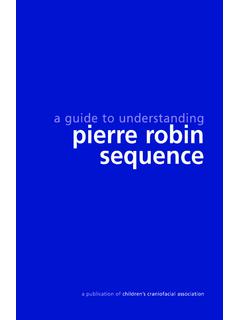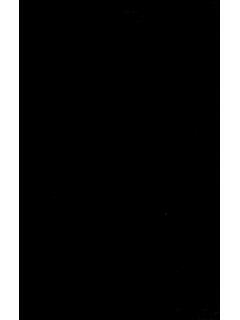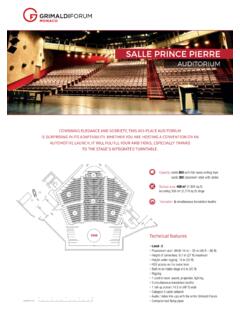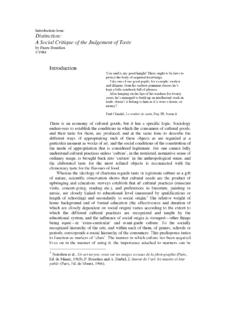Transcription of Pierre Teilhard de Chardin SJ 1881 – 1955 Priest and ...
1 1 Pierre Teilhard de Chardin SJ 1881 1955 Priest and Paleontologist Seeing. One could say that the whole of life lies in seeing if not ultimately, at least essentially. To be more is to be more united and this sums up and is the very conclusion of the work to follow. But unity grows, and we will affirm this again, only if it is supported by an increase of consciousness, of vision. That is probably why the history of the living world can be reduced to the elaboration of ever more perfect eyes at the heart of a cosmos where it is always possible to discern more. Are not the perfection of an animal and the supremacy of the thinking being measured by the penetration and power of synthesis of their glance? To try to see more and to see better is not, therefore, just a fantasy, curiosity, or a luxury. See or perish. This is the situation imposed on every element of the universe by the mysterious gift of existence.
2 And thus, to a higher degree, this is the human condition. ( Pierre Teilhard de Chardin : The Human Phenomenon, trans. Sarah Appleton-Weber, p. 3) The day will come when, after harnessing space, the winds, the tides, and gravitation, we shall harness for God the energies of love. And on that day, for the second time in the history of the world, we shall have discovered fire. ("The Evolution of Chastity," in Toward the Future, 1936, XI, 86-87) 2 The phrase Sense of the Earth should be understood to mean the passionate concern for our common destiny which draws the thinking part of life ever further onward. In principle there is no feeling which has a firm foundation in nature, or greater power. But in fact there is also no feeling which awakens so belatedly, since it can become explicit only when our consciousness has expanded beyond the broadening, but still far too restricted, circles of family, country and race, and has finally discovered that the only truly natural and real human Unity is the Spirit of Earth.
3 ( Pierre Teilhard de Chardin : Building the Earth, Building the Earth p. 43) Human Energy presents itself to our view as the term of a vast process in which the whole mass of the universe is involved. In us, the evolution of the world towards the spirit becomes conscious. From that moment, our perfection, our interest, our salvation as elements of creation can only be to press on with this evolution with all our strength. We cannot yet understand exactly where it will lead us, but it would be absurd for us to doubt that it will lead us towards some end of supreme value. From this there finally emerges in our twentieth century human consciousness, for the first time since the awakening of life on earth, the fundamental problem of Action. No longer, as in the past, for our small selves, for our small family, our small country; but for the salvation and the success of the universe, how must we, modern men, organize around us for the best, the maintenance, distribution and progress of human energy?
4 ( Pierre Teilhard de Chardin : Building the Earth, Human Energies p. 67-68) 3 The Heart of Christ at the heart of matter. (Letter to Jeanne-Marie Mortier, 30 October 1948, Lettres: Jeanne Mortier, 48) Science alone cannot discover Christ. But Christ satisfies the yearnings that are born in our hearts in the school of Science will, in all probability, be increasingly impregnated by mysticism. (My Universe, 1924, IX, 83) The great cosmic attributes of Christ, those which (particularly in St John and St Paul) accord him a universal and final primacy over creation, these only assume their full dimension in the setting of an that is both spiritual and convergent. (Catholicism and Science, 1946, IX, 189) Christ has a cosmic body that extends throughout the universe. (Cosmic Life, 1916, XII, 58) Creation, incarnation and redemption are to be seen as no more than three complementary aspects of one and the same process.
5 (Reflections on Original Sin, 1947, X, 198 E) The mystical Christ, the Universal Christ of St Paul has neither meaning nor value in our eyes except as an expression of the Christ who was born of Mary and who died on the Cross. (The Divine Milieu, 1926-1927, IV, 105) 4 It seems we are now reliving after 1,500 years the great conflicts with arianism - with the big difference that we are now concerned with defining the relations, not between Christ and the Trinity, - but between Christ and a universe that has suddenly become fantastically large, formidably organic and more than probably poly-human (n thinking planets - millions perhaps). And if I may express myself brutally (but expressively) I see no valid or constructive way out of the situation except by making through the theologians of a new Nicea a sub-distinction in the human nature of Christ between a terrestrial nature and a cosmic nature.
6 (Letter to Andre Ravier SJ, 14 January 1955, Lettres intimes, 452) Adherence to Christ in the Eucharist must inevitably, ipso facto, incorporate us a little more fully on each occasion in a christogenesis which is none other than the soul of universal cosmogenesis. (Introduction to the Christian Life, 1944, X, 166) Faith in humankind does not appear capable of being satisfied without a fully explicit Any other method would only lead to confusion or to syncretism without any vigour or What we lack is the clear perception of a well- 5 defined (and real) type of God and an equally well-defined type of humankind. If each group maintains its own type of God and its own type of no agreement can be taken seriously: it will do no more than produce equivocations or pure sentiment. (Ecumenism, 1946, IX, 197-198) The Church, the reflectively christified portion of the world, the Church, the principal focus of interhuman affinities through super-charity, the Church, the central axis of universal convergence and the precise point of contact between the universe and Omega Point.
7 (My Fundamental Vision, 1948, XI, 191-192) Through the incarnation God descended into nature in order to super-animate and take it back to him. (Mysticism of Science, 1939, VI, 178) The Cross is not a shadow of death, but a sign of progress. (Christianity in the World, 1933, IX, 108) It has sometimes seemed to me there are three weak stones sitting dangerously in the foundations of the modern Church: first, a government that excludes democracy; second, a priesthood that excludes and minimises women; third, a revelation that excludes, for the future, prophecy. (Letter to Christophe de Gaudefroy, 7 October 1929, Lettres in dites, 80) 6 The future is more beautiful than all the pasts. (Letter, 5 September 1919, Making of a Mind, 306) I, Lord, for my very lowly part, would wish to be the apostle and (if I dare be so bold) the evangelist of your Christ in the universe.
8 (The Priest , 1918, XII, 219) Love is the most universal, the most tremendous and the most mystical of cosmic forces. Love is the primal and universal psychic energy. Love is a sacred reserve of energy; it is like the blood of spiritual evolution. (The Spirit of the Earth, 1931, VI, 32, 33, 34) "Glorious Christ, you whose divine influence is active at the very heart of matter, and at the dazzling centre where the innumerable fibres of the multiple meet: you whose power is as implacable as the world and as warm as life, you whose forehead is of the whiteness of snow, whose eyes are of fire, and whose feet are brighter than molten gold; you whose hands imprison the stars; you are the first and the last, the living and the dead and the risen again; it is to you to whom our being cries out a desire as vast as the universe: In truth you are our Lord and our God!
9 Amen. (The Mass on the World, 1923, XIII, 131-132) In the beginning was Power, intelligent, loving, energising. In the beginning was the Word, supremely capable of mastering and moulding whatever might come into being in the world of matter. In the beginning there were not coldness and darkness: 7 there was Fire. (The Mass on the World, 1923, XIII, 121-122)




